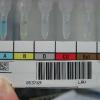Reputation Activity
-
 SMILLER reacted to R1R2 in Hi, I have a question for the blood bank!!!
SMILLER reacted to R1R2 in Hi, I have a question for the blood bank!!!
Without knowing many details -
A lot of reasons for #1 such as false positive or false negative. Another reason is an antigen on the screening cells is not on the panel. Would advise to go over everything again and ascertain testing was performed correctly, review antigen profiles on the screening cells to see if there is an antigen on it that is not on the panel cells (like Lua) and then give AHG compatible(and possibly antigen negative) blood.
#2 - IN addition to false negative, antibody may be weak or screening cells may have weakened expression of the antigen. Rule out all clinically significant antibodies and give AHG compatible, antigen negative blood.
This is only a very short list of what may be going on. I would advise you to find someone proficient in immunohematology to help you out before transfusing anyone.
-
 SMILLER got a reaction from ANORRIS in High Risk transfusion form
SMILLER got a reaction from ANORRIS in High Risk transfusion form
Signature each admission. After discussion, this is usually done by a hematologist. (It is really not that big of a deal "bureaucratically" for us. Perhaps large medical centers have more turf issues with this type of thing.)
Scott
-
 SMILLER got a reaction from Ensis01 in Non cellular component transfusion and historical ABO/Rh
SMILLER got a reaction from Ensis01 in Non cellular component transfusion and historical ABO/Rh
Of course. There is no link between a previous admission and a current one that is reliable enough to allow for transfusion of any product without at least confirming the ABO/Rh. We have even had a few patients who have been admitted with a friend or relative's ID in order to piggy-back on insurance!
Scott
-
 SMILLER got a reaction from jojo808 in 2nd ABO
SMILLER got a reaction from jojo808 in 2nd ABO
We do not test a different specimen. Currently regulators in the US only require a second ABO test (in order to release "electronic crossmatched" units). We test the same specimen twice, unless we have a previous record.
However, we DO use a BB armband specific for BB specimen draws and transfusions. The phlebotomist applies it and it must be used when ordering, issuing and transfusing blood products.
Scott
-
 SMILLER got a reaction from jojo808 in 2nd ABO
SMILLER got a reaction from jojo808 in 2nd ABO
I do not think there is any way to always avoid WBIT. If a particular error in patient or specimen ID can be made once, it can be repeated. What a second specimen does is verify that the two specimens are the same ABO/Rh--which is good enough to avoid an ABO acute hemolytic transfusion reaction.
Using a BB armband P&P properly will assure you that the blood you are testing and the patient it is being tested are the same--even if the patient ID is wrong.
Scott
-
 SMILLER reacted to Dansket in 2nd ABO
SMILLER reacted to Dansket in 2nd ABO
Your post suggests that patients who initially type group O should be tested a second time for not only ABO, but also Rh and Antibody Screen. I assume you would include the same testing (ABO, Rh and Antibody Screen) for non-Group O patients. I disagree.
Does anyone (US and UK) in this forum repeat the Antibody screen on the same sample or a newly collected blood sample? Repeat the Rh?
The concept of a second ABO typing did not emerge until after the "Computer Crossmatch" became an alternative method (to the serological crossmatch) approved by the FDA in the late 1990’s. Repeat testing of the same sample or a newly collected blood sample for Rh and Antibody screen was not required by the FDA, AABB or the CAP.
A second ABO typing is intended to be a serological alternative to the Immediate-spin Crossmatch to confirm the patient's ABO determination when a "Computer Crossmatch" is done. This creates a process that is similar to that done for donor units, i.e., blood type determination by donor center and blood type confirmation by the Transfusion Service.
In the absence of a "Computer Crossmatch", a serological Immediate-spin Crossmatch is required to detect ABO incompatibility between donor and recipient and most patients are transfused based on a single ABO determination without any repeat testing for Rh or Antibody Screen.
-
 SMILLER got a reaction from tkakin in Massive Transfusion and Incompatible Plasma
SMILLER got a reaction from tkakin in Massive Transfusion and Incompatible Plasma
If at all possible, they would have to consult with our pathologist. Then beyond that, the physician in charge of the case would have to provide documentation that it is an emergent situation and that they are aware that they are transfusing incompatible product.
Having said that, it seems like it would be a really bad idea. Giving A plasma to an unknown is one thing, but O plasma?
Scott
-
 SMILLER reacted to Malcolm Needs in Red Cell Storage Position
SMILLER reacted to Malcolm Needs in Red Cell Storage Position
It is true that haemolysis can most easily be seen if the unit is stored in an upright position (note the phrase "most easily" - I am NOT saying that haemolysis cannot be seen if the unit is stored flat), however, more units can be stored in an upright position WITH the expiry date showing, than can be stored with them flat. If you have to move an upright unit to see an expiry date (or, in the UK, an Rh and K type - available on ALL units), you can easily do so without disturbing the red cell - plasma/SAGM interface, so that haemolysis is still easily seen, particularly as the units are usually in a cardboard box type thing to keep them upright. This is not so easy if the unit is stored flat and, in addition, it takes up more space in the average blood bank refrigerator, most of which are designed to take upright units.
-
 SMILLER reacted to Ensis01 in Red Cell Storage Position
SMILLER reacted to Ensis01 in Red Cell Storage Position
Upright: so you can read the unit number plus the segments can be kept tidy to avoid getting tangled with each other, and observe hemolysis.
-
 SMILLER reacted to ANORRIS in Red Cell Storage Position
SMILLER reacted to ANORRIS in Red Cell Storage Position
It is also easier to take inventory when they are standing up. If they are flat you would have to pick them up to count????
-
 SMILLER reacted to David Saikin in Inspection Questions
SMILLER reacted to David Saikin in Inspection Questions
You don't need to keep those records about irradiation. You are not performing it.
As an inspector I almost always look at standards which I have been cited for. (I always disliked when the inspector said: "I knew I'd have to look really hard to find something in Dave's lab). That's not my style. I only dig if what I am finding merits such.
I always look to verify you have corrected any prior deficiencies (these are given to us as part of the packet).
I observe your staff and attempt to correlate what they are doing with what your policy/procedure says they should do. I also ask your staff (without a senior staff member accompanying me) about their work environment, employer, ability to attend CE programs.
I want to see your quality stuff, especially any reports which you should have generated based on your QP. If you don't have anything it will be a long day for both of us.
I will want to observe a transfusion or at least speak w a nurse about transfusions. Nursing training for transfusion and knowledge of reactions - this will be from Nursing Ed/Admin
I don't want to review your procedure manual unless you ask me to look at specific items or you have added something new. I do want to see your table of contents so I can see what you do - I may take a peek at something there that piques my interest (I may also ask you if I might have a copy if it is something I'd like to bring to my own operation).
There are lots of funny stories but you'll have to be inspected by me to hear them. (actually, most of them are quite sad as they involve citations).
I tell your staff to relax because when I go back to work I do the same thing they do.
I was an AABB inspector/assessor for 20+yrs. Still a CAP Team Leader.
-
 SMILLER got a reaction from John C. Staley in Billing - Second ABO/RH for Resolving Discrepancy
SMILLER got a reaction from John C. Staley in Billing - Second ABO/RH for Resolving Discrepancy
I don't think so. It's not like charging for a antibody ID after getting a positive screen. It would be more like repeating a charge for, say, a potassium because the analyzer failed on running it the first time. So I would say no, you cannot bill again.
Scott
-
 SMILLER reacted to Ensis01 in Red Cell coming from other institution with a patient
SMILLER reacted to Ensis01 in Red Cell coming from other institution with a patient
My experience is that When a patient is being transferred from another facility with cross matched RBC or other products; infusion should have started by the time they leave the ambulance. Products not being infused are discarded unless they have correct transfer paperwork, I.e. for antigen neg units. Crossmatching process begins again. To put it another way if you know the patient is coming; the other facility Dr. Orders enough products to cover the journey. If the patient is a hard work-up get all information and transfer antigen negative units. If worked up at a reference lab: Reference labs have a form that will allow transfer of results though receiving facility do not always accept these results.
-
 SMILLER got a reaction from Dansket in Billing - Second ABO/RH for Resolving Discrepancy
SMILLER got a reaction from Dansket in Billing - Second ABO/RH for Resolving Discrepancy
I don't think so. It's not like charging for a antibody ID after getting a positive screen. It would be more like repeating a charge for, say, a potassium because the analyzer failed on running it the first time. So I would say no, you cannot bill again.
Scott
-
 SMILLER reacted to DebbieL in Daily QC for ABO Reagents
SMILLER reacted to DebbieL in Daily QC for ABO Reagents
Our QC was minimal several years ago based on the fact that the first ABO back type would confirm the antisera. The standard says the Anti-IgG reactivity is checked during crossmatching. I think our QC only had about 6 tubes and 1 gel card. Very minimal! But I started thinking that we didn't actually have proof the AHG worked on a particular day. (If it isn't documented you didn't do it) I thought proof needed to be added or some tech working that day would need to remember to mark the form hours later. I knew this would get missed multiple times in a year so I added these to the QC form. I even had them add the lot numbers of items that aren't QC'd like the saline cube or the AntiC3b,-C3b. If asked, I have a record of the lot numbers in use on that day if we should need cough up the lot number.
Later I read that all reagents must have a check against known positives and negatives so I expanded the QC. It now has about 13 or 14 tubes and 2 gel cards. It is overkill but like I said they can't ding me for not doing enough. I would rather do too much than not enough.
-
 SMILLER reacted to Neil Blumberg in National Whole Blood Summit 2019
SMILLER reacted to Neil Blumberg in National Whole Blood Summit 2019
Randomized trials from the 1990s show that clinical refractoriness (a death sentence pretty much) is two times higher when randomly selected ABO platelets are transfused (e.g., whatever is about to outdate) and five times higher when ABO incompatible are intentionally transfused.
The rest of the data come from laboratory studies and observational clinical data. ABO non-identical platelets are associated with 50% increases in red cell use in trauma patients and and 15% higher mortality rates. In cardiac surgery, the receipt of two or more ABO non-identical platelets increases red cell transfusions by 50% and mortality by several fold compared with patients matched for the same number of ABO identical platelets. ABO non-identical plasma is associated with significant increases in sepsis and acute lung injury in surgical patients, after adjustment for other prognostic factors.
In vitro, ABO immune complexes cause hemolysis in group O red cells, interfere with platelet and endothelial cell function.
If it walks like a duck and quacks like a duck, it's likely a duck :).
We have all the knowledge we need to decide to stop prioritizing inventory management and prioritize not infusing incompatible ABO antigen and antibody, and it is feasible if you put your back into it in a larger hospital. Harder for AB patients and smaller hospitals, but we can at least stop pretending that universal donor products are equivalent to ABO identical products in efficacy and safety. They are not, even if we use them in emergencies.
The references for all this (about a dozen studies) are in the Anesthesia and Analgesia paper listed above if anyone is interested. The other issue is that those that reject these conclusions have no data of their own to show that ABO non-identical platelets and other products are effective and safe, only expert opinion and historical habits of practice.
-
 SMILLER reacted to Neil Blumberg in National Whole Blood Summit 2019
SMILLER reacted to Neil Blumberg in National Whole Blood Summit 2019
What are you referring to with "95% of recipients of AB plasma have antibody to the soluble antigen present"?
I'm referring to the unknown ABO type patient who receives AB plasma, or the intentional use of AB plasma for all patients despite knowing the recipient's ABO type. All of those O, A and B patients have antibody that will react with the A and B soluble antigens that are present in AB plasma (even in non-secretors, albeit in smaller amounts). We and others have empirical and laboratory evidence that these immune complexes interfere with platelet and endothelial cell function/integrity leading to increased bleeding, lung injury, sepsis and mortality.
Even with low titer O Pos WB units aren't you going to see just as much formation of antigen-antibody complexes as you do with a non-type specific platvelet pheresis? The volume of plasma will be about the same and will contain anti-A, anti-B and anti-A,B, correct?
Don't know for sure, but a little bit of antibody in a body full of antigen may or may not be as dangerous as a little bit of antigen in the presence of lots of antibody (think about anaphylaxis versus the safety of IVIgG). The biologic and clinical consequences of immune complex formation may well be dependent on ratios of antigen to antibody, and the size of the complexes formed. In general, lots of antibody on a bit of antigen seems to more biologically active than a lot of antigen with modest amounts of antibody.
What about the Trauma centers that are using A plasma - is that any better?
One of the first clues is that A plasma is no worse than AB, suggesting that the antibody content makes little difference. Group A plasma is at least identical with 40% of recipients. Time will tell, but I suspect that low titer O plasma and whole blood will be no worse than our current practices where we give tons of incompatible soluble antigen (and sometimes cellular antigen with platelets).
-
 SMILLER got a reaction from tcoyle in Can't apply for BB test because employer won't train me on required ABO, crossmatching, etc processes
SMILLER got a reaction from tcoyle in Can't apply for BB test because employer won't train me on required ABO, crossmatching, etc processes
Agree with John's points, above.
I am not sure I have ever heard of a person doing ANY non-waived Lab testing without having earned a degree specifically in medical lab science. Even with that, you would have to have passed a national board exam in the US. Possibly there have been people grandfathered under certain circumstances?
Regardless, the thing about training is, I can train a high school student to perform the steps to start a test or do routine maintenance in a Lab. But they would not have the education required to understand what "it all means", which is essential in pretty much any healthcare profession--especially one so technical as Lab Science.
You may, indeed, have earned credits in inorganic and organic chem, microbiology, etc, but if you look at a certified program for a MLS (or MLT for that matter) you will see that beyond basic biology and chemistry, there are a load of specific courses that must be completed as the professional part of such a degree. A general biology degree (or any other type of degree for that matter), whether AAS, BS, MS or PhD, does NOT qualify a person to perform most of the functions done by a Lab Tech.
Scott
-
 SMILLER reacted to carolyn swickard in National Whole Blood Summit 2019
SMILLER reacted to carolyn swickard in National Whole Blood Summit 2019
What are you referring to with "95% of recipients of AB plasma have antibody to the soluble antigen present"?
Even with low titer O Pos WB units aren't you going to see just as much formation of antigen-antibody complexes as you do with a non-type specific platelet pheresis? The volume of plasma will be about the same and will contain anti-A, anti-B and anti-A,B, correct?
What about the Trauma centers that are using A plasma - is that any better?
-
 SMILLER reacted to Malcolm Needs in DARALEX/DARATUMUMAB PATIENTS
SMILLER reacted to Malcolm Needs in DARALEX/DARATUMUMAB PATIENTS
If you use DDT, you won't last long either!!!!!!!!!! SORRY, I couldn't resist it!!!!!!!!!!
-
 SMILLER reacted to Malcolm Needs in cold antibodies
SMILLER reacted to Malcolm Needs in cold antibodies
With reference to the ABO reverse grouping problems that cannot be resolved at RT, instead of incubating the tests at 4oC for 60 minutes, have you tried incubating at 30oC, or, in extreme cases, 37oC, or using cord red cells. Most of these "cold" antibodies have a specificity involving I or IH, and so, in the majority of cases these methods will resole the problems, without compromising the ABO antibodies, which, as we know from unfortunate transfusion reactions, work pretty well at 37oC!
Turning to your specific questions:
Q1. Firstly, we wouldn't test the plasma at 4oC. What is the point? Apart from Zombies in Holywood films, how many humans do you know who survive with a body temperature of 4oC? All we would do is test the antibody for its thermal amplitude, and if it does not react at 30oC, we ignore it (see Petz LD, Garratty G. Immune Hemolytic Anemias. 2nd edition, 2004, Churchill-Livingstone). If the antibody does react at 30oC AND is an alloantibody, we would be more proactive, identify the specificity, and give antigen negative blood. If it was an autoantibody, we would ignore it for transfusion.
Q2. Apart from the above, NO!
Q3. Why would you want to remove the IgM from the red cells. They will hardly ever be swamped by the autoantibody, but, if they are, we would use Rabbit Erythrocyte Stroma (RESt), which is available commercially. Unfortunately, this also adsorbs anti-B, and so the plasma adsorbed like this should never be used for cross-matching, as a group B mis-match would never be detected.
Q4. I am going to be VERY cheeky here, and I say this with no evidence whatsoever, and that I will probably be slated by most members on this site, possibly rightly so, but I think that, as you are a Reference Laboratory worker, your techniques for working with these samples are more "honed" than those of the average hospital laboratory, as you see them far more often than do the hospital laboratories.
I will now go and don body armour and a steel helmet!!!!!!!!
-
 SMILLER got a reaction from jojo808 in Transfusing Blood in the OR
SMILLER got a reaction from jojo808 in Transfusing Blood in the OR
We had situations like you describe a few years back. Now checking the Blood Bank (and hospital) armbands are part of the "time-out" check-off before the patient is strapped to the table. The ID info on the bands are recorded so it is available at all times during the procedure.
Scott
-
 SMILLER got a reaction from Ensis01 in Can't apply for BB test because employer won't train me on required ABO, crossmatching, etc processes
SMILLER got a reaction from Ensis01 in Can't apply for BB test because employer won't train me on required ABO, crossmatching, etc processes
Agree with John's points, above.
I am not sure I have ever heard of a person doing ANY non-waived Lab testing without having earned a degree specifically in medical lab science. Even with that, you would have to have passed a national board exam in the US. Possibly there have been people grandfathered under certain circumstances?
Regardless, the thing about training is, I can train a high school student to perform the steps to start a test or do routine maintenance in a Lab. But they would not have the education required to understand what "it all means", which is essential in pretty much any healthcare profession--especially one so technical as Lab Science.
You may, indeed, have earned credits in inorganic and organic chem, microbiology, etc, but if you look at a certified program for a MLS (or MLT for that matter) you will see that beyond basic biology and chemistry, there are a load of specific courses that must be completed as the professional part of such a degree. A general biology degree (or any other type of degree for that matter), whether AAS, BS, MS or PhD, does NOT qualify a person to perform most of the functions done by a Lab Tech.
Scott
-
 SMILLER got a reaction from Dansket in Immediate spin crossmatch
SMILLER got a reaction from Dansket in Immediate spin crossmatch
If I understand the question, I think that you could say that any negative reverse reaction on the patient's ABO typing would serve as a negative control--however, this would not be good enough for O patients. For a positive control, you would likewise be stuck on AB patients. But I do not think that patient specimens are regulated as "QC-able" materials in the case of a IS XM.
Regardless, I would think that the "pos/neg" QC regulations are concerned with validating reagent reactivity and system integrity, and not so much with one patient's specimen reacting with another's RBCS.
Scott
-
 SMILLER reacted to slsmith in Immediate spin crossmatch
SMILLER reacted to slsmith in Immediate spin crossmatch
We use it during a computer downtime when the transfusion is needed before the computers come back up. Then once the computers come back up the units are retroactivity computer xm/dispensed





